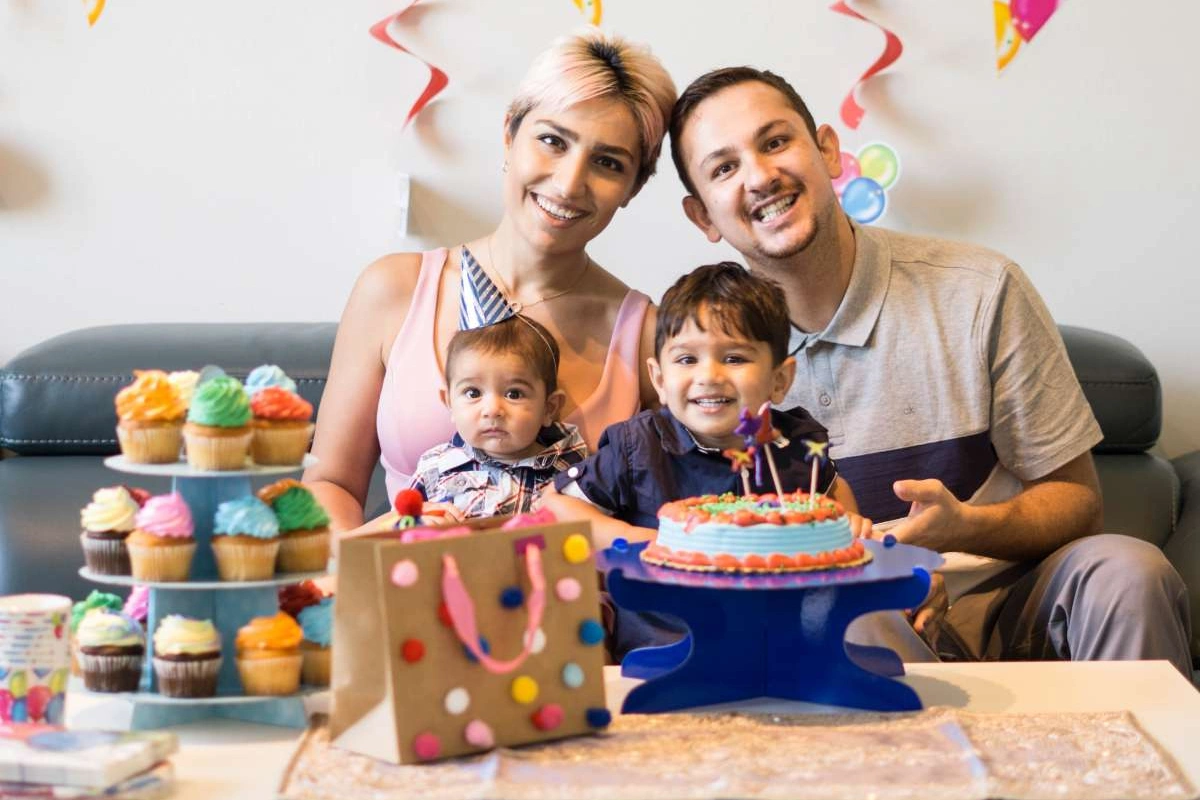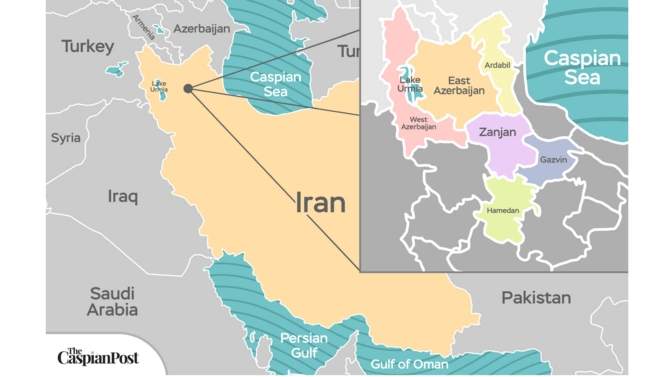
In Florida, Darya Hodaei runs an online education platform called EnglishAzerbaijani to promote and teach the Azerbaijani-Turkic language and culture. Read how discovering language helped Hodaei discover herself.
Darya Hodaei and her family. Image: Darya Hodaei
As well as her day job as a Florida pharmacist, Darya Hodaei runs a bilingual social media-based platform called EnglishAzerbaijani that helps promote Azerbaijani Turkic language and culture. Darya was born and raised in Tabriz, the capital of Iran’s East Azerbaijan province. A precocious child who was quickly recognized as having exceptional talents, she did well in school, gained a doctorate of pharmacy degree, and ran a community pharmacy before immigrating to the U.S. in pursuit of better opportunities. She shared her story with the Caspian Post.
When I arrived in the USA, it took me a while to realize the “identity gap” in my life. Back in Iran, I made a few attempts at writing in Azerbaijani, but failure was inevitable due to the lack of official education and limited resources. My parents themselves also were deprived of education in their own native language. Having lived in that rigid environment, I did not have much of an idea of what would be fair politically or human rights-wise, or correct in terms of ethnic identity and language policies.
I used to believe that talking about ethnic rights was bound to bring hostility. In Iran, any movement that had tried to improve our ethnic and linguistic rights had been suppressed by the system. Even fellow Azerbaijani-Turks would sometimes label those fighting for our linguistic rights as separatists (or worse), rather than realizing that they just wanted ethnic and linguistic rights for all Iranians, us included. I always approached the topic very cautiously or ignored the problem's existence as a coping mechanism.
However, over time, it dawned on me that I really was free from that censured milieu. My level of awareness and mindset dramatically changed. Seeing Latinos in Florida preserving and promoting their language and culture was eye-opening. Bilingual or multilingual restaurant menus, school forms, and government paperwork all made me ponder. Soon, I was questioning why we were deprived of these simple and fundamental rights in Iran.
I realized that so much of the debate on such issues in Iran, whether through social media or celebrity voices, had either been polarized or suppressed. The system would deem and treat any voices pertaining to this issue political. Meanwhile, those who wanted a straightforward chance to use their language non-politically would often get frustrated in the process. Unfortunately, many of the Iranian elites and celebrities with a large fan base have either taken a vow of silence, or twist the topic in a way that would damage the cause. Either way, they just add salt to the wound.

These new realizations made me wonder about my ethnic identity. I wasn’t sure whether I should call myself a Persian or a Turk? The power of language connects people and is a major determinant of one’s identity. For example, people of Latino ethnicity are spread across many continents yet can still identify as Latino regardless of nationality without being denied this basic right. I thought to myself, if I am speaking Azerbaijani Turkic, then I should be able to establish a similar bond to Azerbaijani Turks. But at that time, I did not feel like I belonged to the Azerbaijani Turks’ ‘club.’ After all, I spoke a variant of Azerbaijani Turkic, which was highly influenced by Persian, which contributed to a sense of confusion. Long story short, I was not sure who I was.
When we were expecting our first baby, I started getting nervous, wondering which language I would use to communicate with my children. I knew a lot of nursery rhymes and stories in Persian because these are so widely promoted in the Iranian media. I was fully proficient in Farsi language and literature after 18 years of elementary school and higher education, not to mention almost every channel on national television is in Persian. In contrast, I knew almost nothing about the nursery rhymes, history, or written language of my own Azerbaijani Turkic language. If I knew something here and there – it was certainly not with the confidence necessary to teach my kids.

The first thing I needed to learn about my Turkic culture was the official writing system of my mother tongue. Azerbaijani and Persian are written in Arabic script in Iran, but Azerbaijani Turkic has more letters and vowels than Persian, so learning Persian was not enough to learn Azerbaijani’s Arabic script. Moreover, Turkic languages are not in the Indo-Iranian language family partly because of the different grammatical structures. Turkic Languages comprise their own language family, including Azerbaijani, Turkish, Uyghur, Turkmen, Tatar, and others.
When Iranian Azerbaijani Turks go to school, they must study in a completely different linguistic structure than their mother language. The product of this is even more complicated because the different linguistic structures taught in schools eventually bleed into and change the integrity of the students’ own use of their native language. These gradual impacts fan out and accumulate over generations. Eventually, Azerbaijani Turkic may become so compromised that it will lack standard structure, and a significant amount of vocabulary will be replaced by words of Persian or Arabic root.
So, every time I tried to form linguistic links with the Turkic world, the written structure and some words seemed unfamiliar. Also, even once I could understand the meaning, I could not relate my distinct accent to the official language format. It was as though my identity was based on an unknown place instead of being a separate root of an old tree. Internalizing the new writing system at the age of 30 was by no means easy. I tended to write down exactly what I was pronouncing verbally, showing an apparently very low level of literacy. Four years on, learning my mother language remains an ongoing journey, and I am still fascinated by learning new aspects. However, the journey has helped me overcome identity issues and improved my ethnic self-awareness and general self-esteem. It has opened my eyes to the importance of learning Azerbaijani literature and how to write one’s mother tongue early in life. My books and website are aimed to assist with this task for the next generation.
I started digging and finding out the sociological definitions of some words like identity, ethnicity, and nationality. On this path, I came across several informative articles and books on cultural and linguistic assimilation in Iran. After recognizing where the problem stems from, I realized that I needed to connect with Turkic culture and learn about my mother language. So, I educated myself as much as possible and started teaching my toddler son simple Azerbaijani words. I created an Instagram page, named it EnglishAzerbaijani, and kept posting new Azerbaijani words I was learning with their Persian and English equivalents on a daily basis. It was essentially just a way to help myself memorize them. Not long after this, many Iranians and folks from the Republic of Azerbaijan started following EnglishAzerbaijani, which helped the platform grow substantially. In less than a month, I found people from different parts of the world who had a similar passion, and this brought us together to increase awareness and promote Azerbaijani culture and language as a team.
I believe our identity and our understanding of who we are is like a tree. After I started feeding my tree with information about my own roots by learning Azerbaijani, my sense of who I was grew tall. I started writing children’s storybooks in Azerbaijani, which offered me a sense of fulfillment greater than anything I had experienced before. Introducing one’s rich culture to the world is one of the best feelings anyone can get in the journey of exploring identity.
Share on social media